Hello and thank you to new subscribers! This is a free weekly newsletter about life in the Illinois/Iowa Quad Cities. It’s also a place where I write about being a Gen X woman facing the realities of aging all while somehow not truly believing I’m an adult.
New subscribers since last week: 9, which brings me up to 174. Yay! (I’ll keep posting about my growth til I hit 500 subscribers, at which point I’ll be so full of myself it won’t be necessary).
New pledges this week: none. Subscribe and pledge a future paid subscription!
In this issue’s interesting Iowan feature (see the previous one here), you’ll learn about a woman whose work played a hand in helping a certain former Illinois senator make his way to the White House. And let me tell you, if you’re on the right side of the book banning debate — and yes, there is only one right side — part of her Quad Cities legacy will downright give you the goosebumps.
I first met Cathy (known to friends as Cath) Bolkcom just a little over a year ago when she participated in a gathering of strong, inspiring women organized by a mutual friend. Last weekend I was honored to be invited to her 70th birthday party, which also served as a farewell of sorts: after five decades here, Cath is saying goodbye to the Quad Cities so she can be closer to her little grandson in Minneapolis.
As she bids us adieu, (trading the Quads for the Twins), learn about Cath’s amazing contributions to the Quad Cities, and make sure to stay for her responses to the OFFICIAL QUAD CITIZEN QUIZ.
An Interview with Cath Bolkcom
My first question for everyone: why do you live here?
My folks moved our family of nine children here from Minneapolis in 1967. My dad came to WQAD TV in Moline, having started out in television in its very beginnings in Minneapolis at WTCN.
He was in on the ground floor of television, and it was a very exciting time for him, and by extension, for us kids. We spent a lot of time at the TV studio as kids. My dad was a very creative and brilliant TV director and producer and distinguished himself — especially in the Quad Cities — by being a relentless force for giving access to the airwaves to all members of the community. For instance, he recruited Si Roberts, a notable Black Quad Citian, to host the first African American-focused local TV shows in the 70’s.
My dad was also the Quad Cities promoter for the American Wrestling Federation, after producing and directing the original televised wrestling matches with Verne Gagne from the TV studio in Minneapolis in the 60s. (I will confess to being very embarrassed by this. )
What was your early life like here?
It was a huge and difficult move for us children, and I’m sure for my mother who was leaving her family behind in Minneapolis. Even at the ripe age of 12 I felt like we’d been brought to a cultural wasteland, right after all the Dutch elm trees that lined the boulevards had been cut down.
By the time I got to college at Augustana, (chosen because I had no money to go away to school, because in those days we could get a boatload of financial aid to pay for college), I was living on my own, and getting by by working several part-time jobs. I ran into great mentors and teachers at Augie, which started my interest (and subsequent career) in community organizing.
Four years out of college, I married, and we began a family. My husband’s parents and my parents were still in the Quad Cities. (All of my other siblings fled the Quad Cities as soon as they could.)
Tell us about about changes you’ve witnessed, either in the QC or in your own life, (or both).
I always felt as a young parent, and as community organizer, that this area was a particularly advantageous place to live and work as an organizer. It was a fine place to raise children and a manageable size for comfortable living on various levels. I always felt that it was particularly useful as an organizer to work in the communities (split up as they were, governance-wise) and in a metropolitan area that was not so large that you could never see the effects of your work. I felt it was always possible in the size of cities that we were working in (e.g., Rock Island and Davenport) to be able to affect change because they were of a manageable size.
Having now lived here for 58 years (how can that be??) I’ve watched the Quad Cities develop and grow culturally in incredible ways. From the visual arts to the music scene to performance arts to the colleges, we have an incredible range of options these days to participate and take in amazingly impressive experiences. The development over the past years (due to groups like River Action) of the Mississippi riverfront has brought recreational opportunities and an appreciation of this great river on which we live that didn’t exist in the 60s and 70s.
What led you to become a community organizer?
I grew up in an Irish Catholic Democratic family, and that tells you a lot about what formed me, and how I’ve spent my life. My folks were progressive social justice Catholics, in the days when the Catholic Church we knew focused on the ‘Sermon on the Mount’ and not issues of people’s most personal and private behaviors.
I felt a strong obligation to work to make the world a better place for those less fortunate than I — a product of an aspiring middle-class white household with parents committed to education and social justice.
I was fortunate to be able to go to Augustana on lots of financial aid and study with radical teachers and mentors like Lucian Zamorski and Mary Orr. They solidified my desire to be an organizer, to empower people to affect the policies that were limiting in their lives.
I had no idea until recently that idea you’re an artist, too. Are there other career or personal chapters I don’t know about?
When my children were little, child care was very difficult to come by on the kind of money that I was able to earn, and so I quit working as an organizer for a number of years. At this time I pursued an interest in art, and because of running into brilliant teachers, like Kristin Quinn, and Leslie Bell, I was able to pursue a life in the arts while my kids were growing up. Again because of the size of the Quad Cities, I was able to show my work, photographs and paintings and to have my work accepted into annual shows. I was able to be a part of the QC arts community.
At age 49 when it was time for me to go back to work to help put the kids through college, I got a masters degree in library and information science at the University of Iowa. I had hoped to get a job at one of the local colleges, which would also assist in the education of our three children. Sadly, upon reviewing my rabble-rousing résumé, the colleges declined to hire me. And so I ended up back in organizing.
I pursued my interest in becoming an artist, and then went to grad school to get a degree in library science at age 49 when it was time for me to go back to work to help put the kids through college.
After some public service jobs and more organizing, I trained and worked as a Chaplain in the Genesis system for two years. I then started a business, officiating, funerals and weddings, for the last 10 years of my working life.
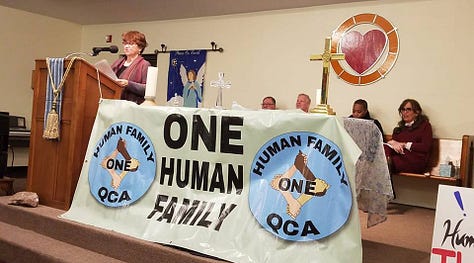
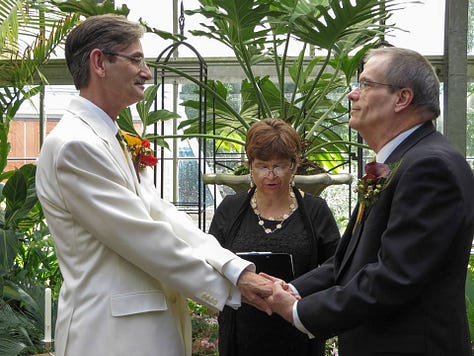
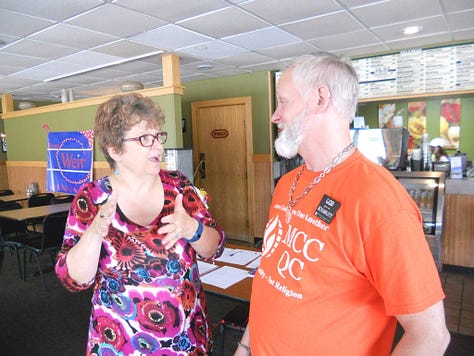
When we met, I was surprised to learn that you were a major force in founding Progressive Action for the Common Good — a group I’d done some volunteering for in the past. How did that group come to be (and why didn’t I know you started it?!)
An important moment in my life as a community organizer was the Pleasant Valley (IL) school board’s decision to limit the use of James Howe’s book The Misfits because one of the young characters was gay. I didn’t imagine that this could actually happen in 2004 in Iowa — I went to the board meeting, where in fact it did happen, and I determined that I could help the affected teachers and the parents to appeal this decision to the State School Board.
Out of that night was born a whole movement. Indeed, we did file an appeal before the state school board, and proved our case very effectively in an administrative hearing. The board did not rule in our favor, but we felt that we had accomplished virtually all we had set out to do by changing the minds and hearts of people in the community. There were waiting lists (to buy and read the book) at libraries and bookstores. We got a grant to buy 100 copies and donate them to local schools and libraries. Ultimately, we brought the award-winning and best-selling author to town. Three hundred people showed up to talk about how we can support gay youth, and directly out of this fight came the organizing of Progressive Action for the Common Good.
Another factor was that George Bush had just been reelected president in late 2004 — which was horrible — and the book appeal coming on the heels of that made it obvious to me that progressives had been out-organized, and that we needed to do something about that. I set out to create a coalition of progressives to remedy this. With many incredible colleagues who came to the table in January 2005, we crafted an organization that could work effectively across a dozen issue-focused groups to effect change and to apply political power. Within three months, we had brought together 400 people to commit to work on a variety of issues — civil rights, equal rights, protecting Social Security, women’s issues, racial healing, healthcare, the environment and more.
What is incredible and very unusual for a truly grassroots organization is that this group is still alive and well almost 20 years later!! And that is due to leadership that has stayed active and true for all of these years. I am not one of those people. I realized that I like to start things! I honor the folks who were at the table at the very beginning, and are still at it these years later. There is a natural ebb and flow to grassroots organizing. It’s very difficult to sustain over years’ time, particularly without full-time paid staff. PACG has defied all of the odds by working so effectively on so many issues for almost two decades.
Looking back on all the years the organization has been around, what’s your proudest PACG-related accomplishment?
My work with PACG put me in this incredible position of being able to play a small part in the launching of a relatively unknown young senator named Barack Obama to the presidency.
I can only feel really grateful that being in Eastern Iowa in 2007, and part of the Iowa caucus process, allowed me to play a very small role in bringing Barack Obama to the national stage with the extraordinary win in the 2008 Iowa caucus. Because of my position with PACG, when presidential campaigns came to Eastern Iowa, I would make an effort to get people like me on board their campaigns early, in order to influence other voters. I was pretty committed to not being committed. But the young staff of amazing organizers, who came to Scott County to organize for Obama, won my admiration and affection. They also allowed me to introduce Senator Obama at his first big rally in Davenport and to moderate a Q&A with about 40 of the progressives from Progressive Action. Listening to Senator Obama that night talk about what he wanted to do as president, and witnessing his incredible presence, intellect and skills, I was won over. He and his advisers went on to run a grassroots ground campaign across the country, the likes of which had never been seen …. and might never be seen again. And we proved that with effective organizing at the grassroots level, unimaginable things can be accomplished. That notion still fires me!
Electing the first black President in this country was hugely important. And that can never be undone. I’m grateful that I got to be a part of it and that my work at PACG gave me entrée into meeting him several more times. It was also very cool to have my comments about the effort in Iowa quoted in the book They Said This Day Would Never Come, an oral history of the Iowa campaign. It was kind of embarrassing to be included, because so many people worked so much harder than I did. The book is a very, very good account of what happened in Iowa. The roles that the Iowa Quad Cities played in the caucus process and in launching Senator Obama to the Presidency is a big deal. And of course, Obama acknowledges that without Iowa, he never would have become President. So all in all, a very cool moment in history, where I was in the right place at the right time.
Any final reflections you’d like to share?
I think that I’ve had a very very rich life here in the Quad Cities. As I’m leaving now, on the eve of turning 70, in order to be closer to my grandson and family in Minneapolis, my birthplace, I am incredibly grateful for all the ways in which living in the Quad Cities shaped me and gave me opportunities to do all the things that I wanted to do — to make a difference in the world as a community organizer, to have the opportunity to make art, to have raised three great kids, to have been part of the effort to elect the first black President of the United States, who was launched to the White House by winning the Iowa caucus, and at the end of my career to have been able to train as a chaplain and officiate weddings for hundreds and hundreds of gay couples who came from all over the country to finally realize their legal right to marry.
How fortunate was I??
And now, Cath completes….
**THE OFFICIAL QUAD CITIZEN QUIZ**
In your opinion, how many Quad Cities are there?
In earlier days as a grant writer, the Quad Cities was referred to for grant purposes and data analysis as a Standard Metropolitan Statistical Area — that is, an area that consists of one or more counties that contain a city or urbanized area having a total population of at least 100,000 people. I have always considered the Quad Cities to be all of the cities and towns that border each other physically. As an organizer, I’ve been inclined to realize that peoples’ interests and needs and desires do not know the boundaries of the relatively small communities that make up the whole.How many degrees of separation are you from John Deere (the company, not the man)?
My brother Joe Bolkcom worked at the John Deere parts warehouse in Milan (IL), right out of high school, and they quickly put him on a management track. Wisely, he returned to college and ended up as an organizer and advocate, spending 20 years in the Iowa Senate, as undoubtedly the most progressive Iowa senator in history.
What’s your favorite meal available in the QC?
Pad Thai and fresh spring rolls at Exotic Thai, Ms Phay’s or Tantra
Favorite spots:
VanderVeer Park, which I was lucky to live three doors from the past six years! All of the amazing places that are available for us to hike and walk in the Quad City area. The Mississippi riverfront, especially on the Iowa side from Bettendorf to Credit Island.
Favorite bridge:
The one they just demolished. I also love the Centennial Bridge.
Favorite standing structure in the QC:
Not sure I can pick one building… I love looking at the Davenport downtown/ neighborhoods from Rock Island.
What did you enjoy most about Davenport (or the QC as a whole) while you were living here?
One of the things that’s always amazed me about the Quad Cities is, given its relatively modest size, is that there are an incredible number of really amazing, intelligent, talented, committed and interesting folks who’ve chosen to make their lives here. Many of the people I’ve met and worked with over the years are folks who would’ve done very, very well in larger urban settings. And yet they chose to spend their adult lives here in the Quad Cities. There’s something really interesting and special about that.
What would you like to see change for the better?
One of the most important issues to me throughout my life has been a keen awareness of the intractable and pernicious racism that exists in our country and in our Quad City communities. It is reflected in all kinds of public and non-public policies and attitudes which adversely affect people of color every single day. It is alive and well in the limited perceptions that people have of certain of our Quad Cities and lots of individual neighborhoods based on their racial make-up. This has been true since I was a kid and is still evident in many residents and business attitudes towards Rock Island and Davenport and wrong-headed opinions people commonly express about our public schools and certain neighborhoods in those communities.
I would very much like to see white Quad Citians lead the way in a concerted community effort to break through our discomfort and denial, to take a good hard look at the racist culture in which we were all raised. It has affected every single one of us, and as long as we refuse to take a hard look at ourselves, to engage in an effort to face the realities about our racist history as a country, and to see how we continue to perpetuate (even unconsciously) the ideas, notions and perceptions that we could not escape taking on, there will be no hope for overcoming our racist past.
Which Quad City needs more love (and why)?
I believe Rock Island and Davenport are both adversely affected by racist attitudes. As we’ve seen nationally and internationally, the forces of xenophobia, racism, and the ‘othering’ of people who are not white is very disturbing, and something that calls for more love and more love and more love and intensive organizing.
Something others should know more about, or that would surprise someone who’s never visited?
The Polyrhythms 3rd Sunday jazz concert series and annual three-day free jazz festival. For the past 16 years, this group has brought incredible jazz players (from international to regional to local talents) to the stage on a monthly basis. For the past nine years, Polyrhythms has produced a three-day free jazz festival that includes music, authors, healthcare forums, activities for kids, performances by kids, movie premiers and more, without appropriate attention and promotion from our local media.
If you could connect the Sky Bridge to something, what would you make it a bridge to?
In the early days of Progressive Action, Reverend Rich Hendricks and I organized a dinner for racial healing called Healing Hands Across The Table. It was a potluck, and we asked people to bring dishes from their ethnic or family traditions. We invited people to wear costume or dress from the places from which their families had emigrated to the States.
We put out a wide call, but we had been very busy with the 2008 election get-out-the vote effort right before the event. The week of the event we only had 40 RSVPs. Rich confidently set up for 300 people that night — and 300 people showed up. Seven different languages were spoken, and we asked people to sit at tables with eight or 10 other people whom they had never met. We had cards with questions on the tables, encouraging each guest to share a story about their family’s history.
People came together and connected in a way that was beautiful and powerful. If you come up with it this sky bridge could lead to a place where people have that opportunity routinely. It is only through relationships that we will heal our communities.
Subscribe (free for now!) to get more posts like this (and look forward to having something in your inbox that is not an ad for you-know-what enlargement). You can also make a pledge for a future paid subscription, put a tip in my Pay Pal jar, or buy me a coffee.
The Iowa Writers’ Collaborative
Have you explored the variety of writers in the Iowa Writers’ Collaborative? These writers are from around the state and contribute commentary and feature stories of interest to those who care about Iowa, (and I’m lucky and honored to be included among them). Subscribe to receive the Sunday morning roundup of our best work from the past week.

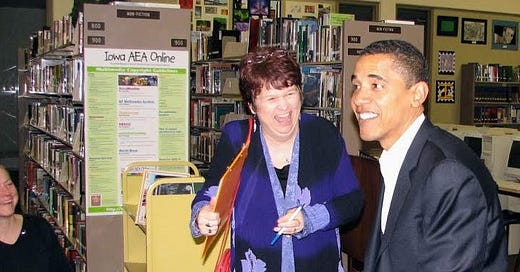

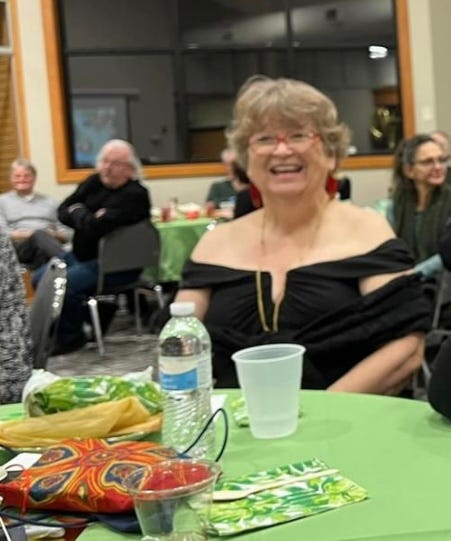
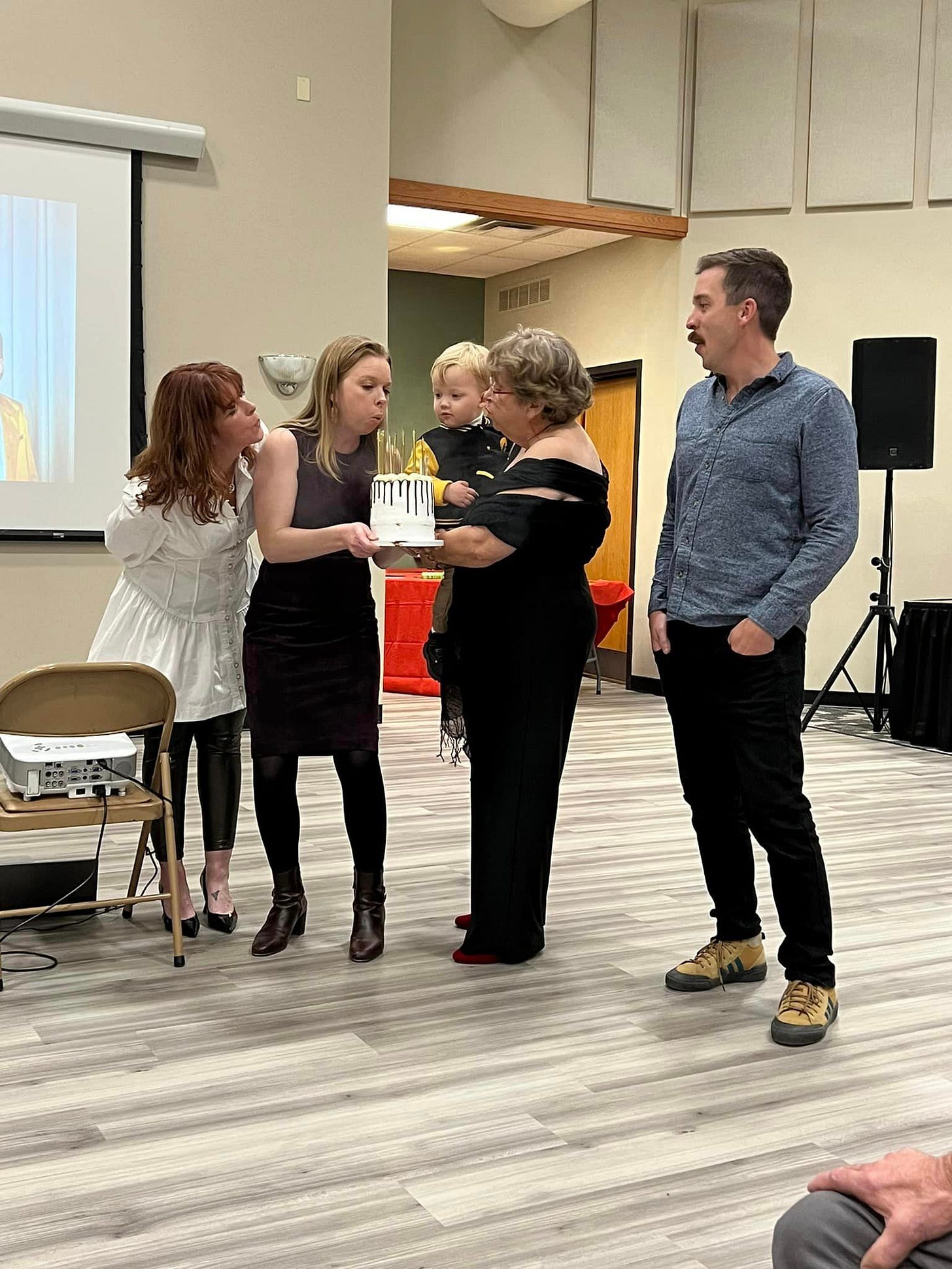
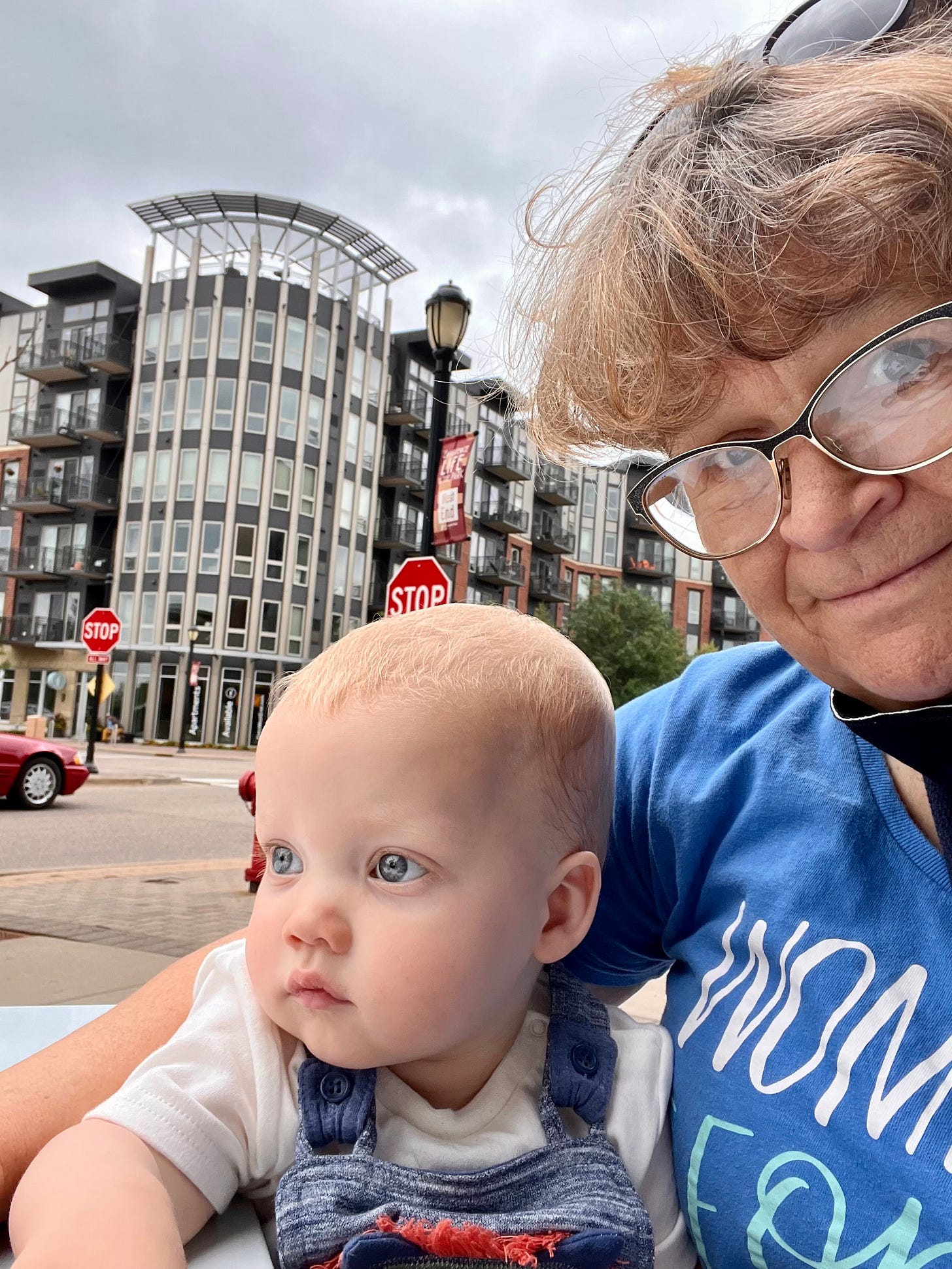


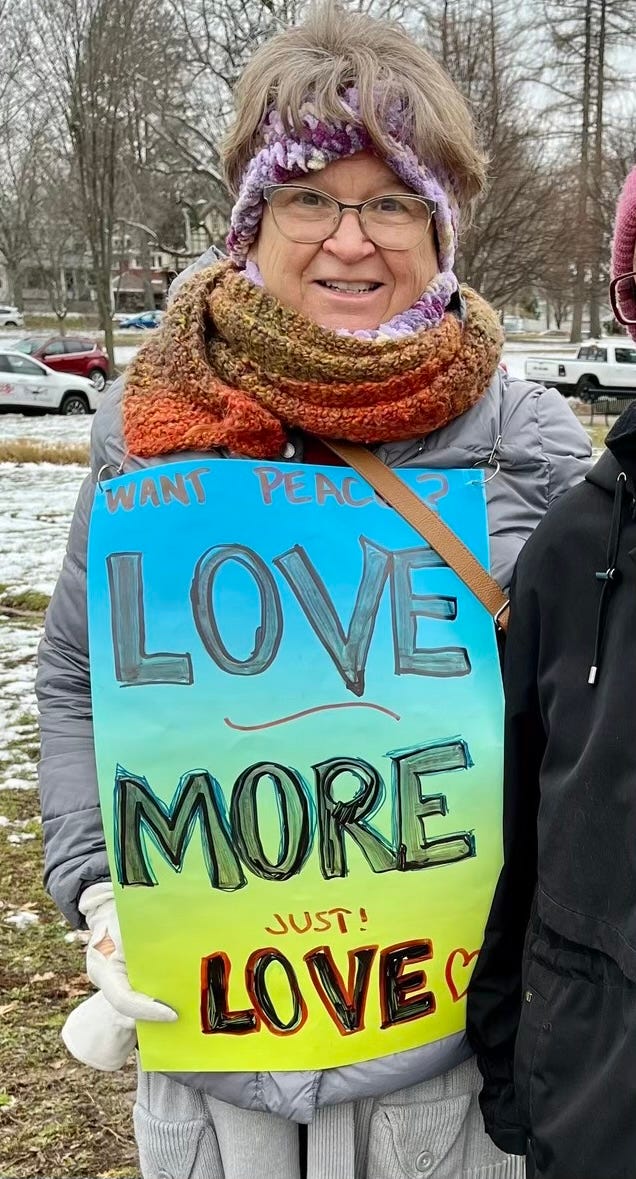
Thanks so much , Alison , for this opportunity to reflect on my life in the Quad Cities!!!
Great interview!! Being the local promoter for Verne Gagne would have been pretty cool....and I would think a good side hustle.